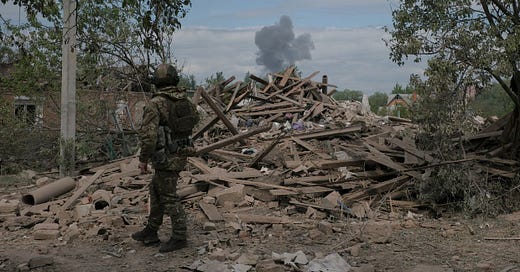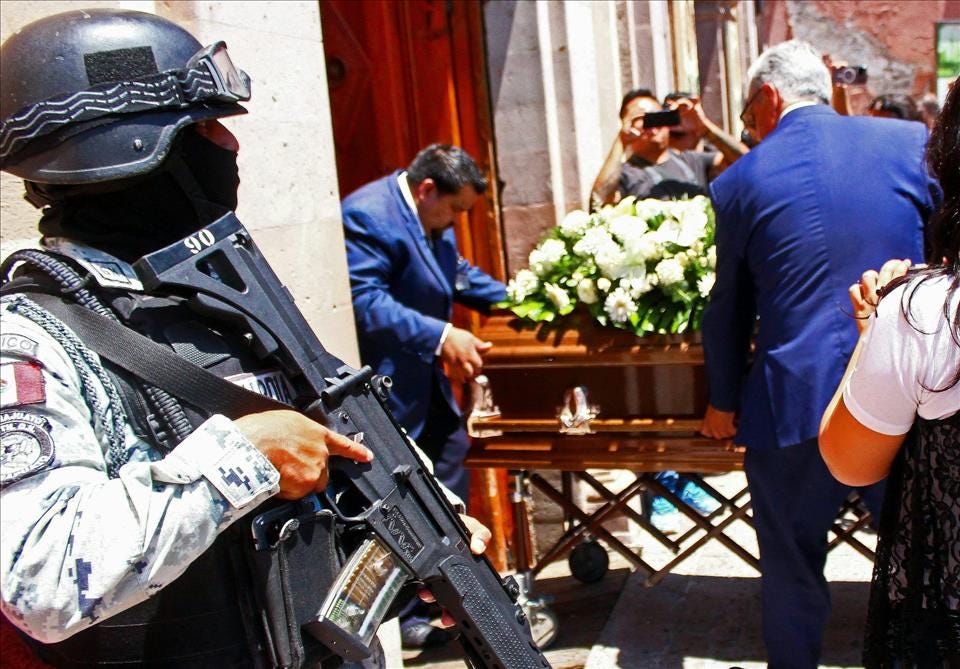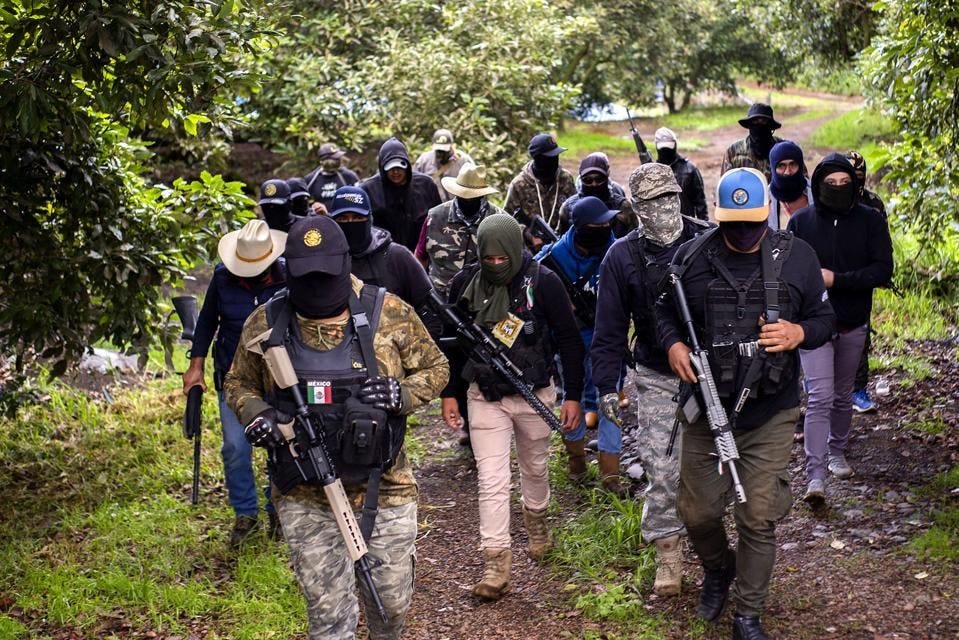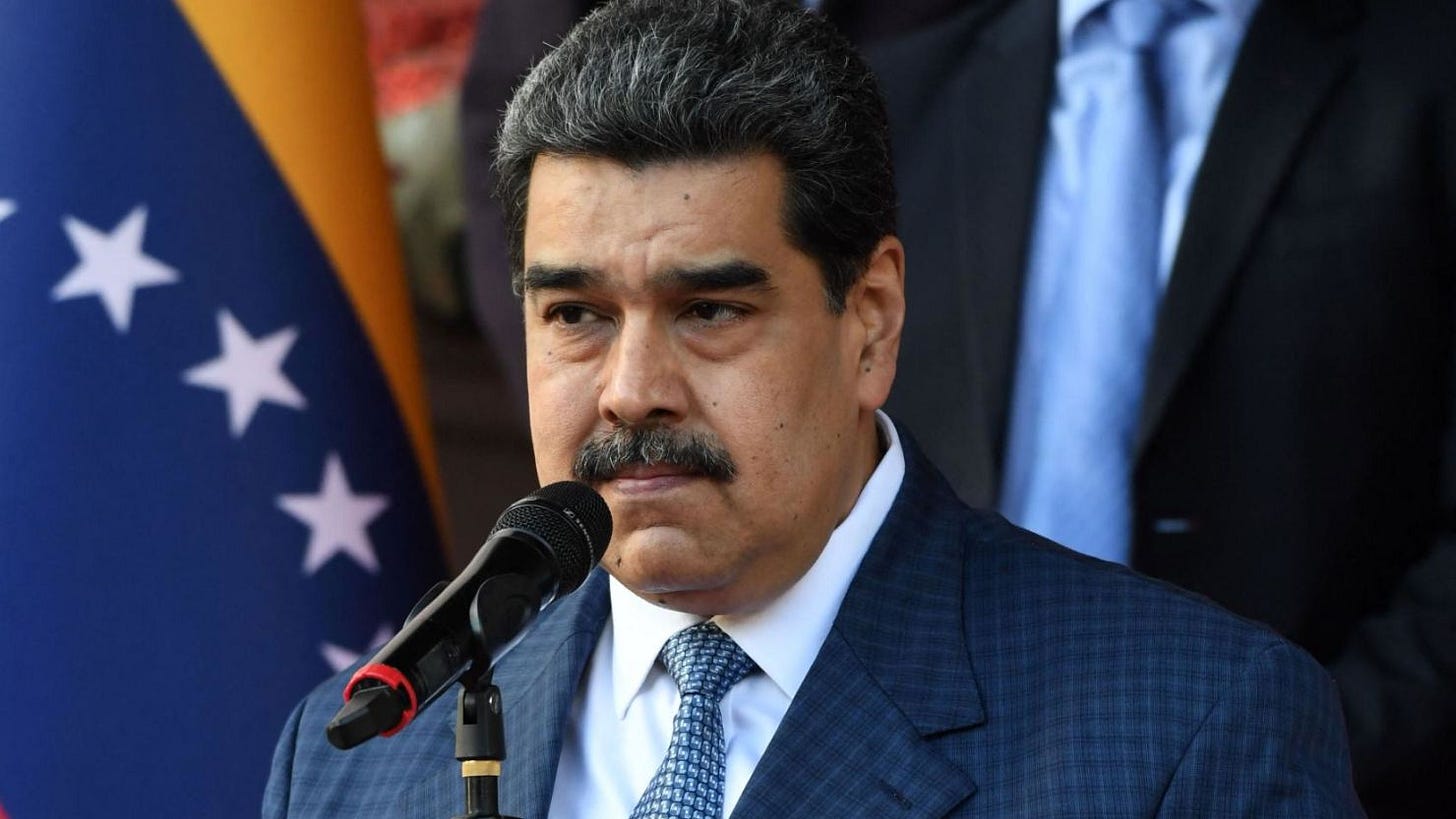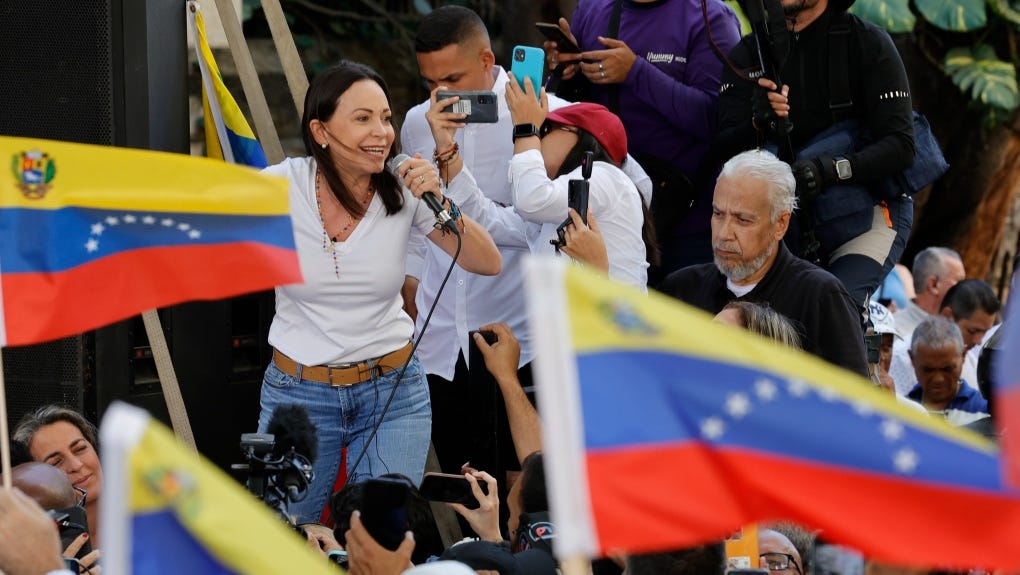Note from Lethal Minds:
Bulletin From The Borderlands is a joint project between Lethal Minds and some of the most talented OSINT analysts and independent journalists working today. Our goal is to provide you with a clear, accurate, and informative view of the world, free from censorship or bias. The Bulletin will bring you the facts, our analysis, and our evidence. We hope you find our work helps you better understand the complicated and increasingly volatile world in which we live.
Be informed, be prepared, be lethal.
The Bulletin Team:
Analyze Educate : Brodie Kirkpatrick (Analyze & Educate) is a Marine Corps infantry veteran. He is a graduate San Jose State University with a Bachelor’s Degree in Political Science. He runs Analyze & Educate, a podcast and associated social media pages discussing geopolitics, armed conflicts, news, and history. In his capacity with Lethal Minds he is the team lead for the Bulletin From the Borderlands, Americas Desk chief, and an editor.
The Expeditionary Intelligence Group : The Expeditionary Intelligence Group Instagram page is a project delivering flash news utilizing open-source intelligence combined with human asset contributions and geographic intelligence to provide the general public with objective bias-free global news that tells the whole story based on the facts and on-the-ground insights they feel are missing from a lot of mainstream news reporting.
The Defense Bulletin: Defense Bulletin is run by John M Larrier. As a civilian, I’ve closely followed strategic developments for close to a decade, but “launched” the Bulletin during the pullout in Afghanistan due to the extreme nature of the misinformation I saw my peers as well as others reading into. The lacuna that the general populace has about these now very prevalent subjects is the stated goal for Defense Bulletin
Robert “Bobby” Acuña is a graduate of Texas A&M University – Corpus Christi with both a BBA in Economics and a BA in Political Science. He was originally born in Subic Bay, Philippines but lived much of his life in Corpus Christi, Texas. He currently resides in Houston, Texas. Growing up in a military family, Robert developed a passion for politics as well as studying war history. Some of his earliest memories were watching World War II documentaries with his grandfather. This led him to his educational path in university. One of his favorite aspects of his collegiate career was political research. His most recent work was with The Modern Insurgent. He believes Bulletin On The Borderlands will help to fulfill that urge to understand and stay consistently aware of the geopolitical issues around the world. Outside of his interest in global affairs, Robert is an avid Brazilian Jiu Jitsu practitioner and rugby player.
ALCON S2: A veteran of the New Zealand military intelligence community, if it walks, talks, or crawls in Asia, ALCON S2 knows about it. Cole is the preeminent source of OSINT for the Oceania and South East Asia region.
Jillian Butler: A lifelong writer and San Diego native. She received her bachelor’s degree in English and History at the University of Ulster in Northern Ireland. Upon moving back to San Diego, she received her master’s in International Relations at the University of San Diego where she centered her research around jihadi terror. She is also a contributing writer for Pop Smoke Media, American Grit, The Modern Insurgent, and Lethal Minds Journal’s Bulletin from the Borderlands. In her free time, she can be found surfing, training jiu jitsu, or improving her craft of cooking the perfect ribeye.
Sponsors
The Bulletin is brought you to by PB Abbate.
As you likely know, Lethal Minds Journal shares common ancestry with Patrol Base Abbate, one of the most impactful veteran’s outreach organizations in America. One of the ways in which we connect is through a love of the written word, a belief in the power of good writing to help give a voice to people who need to be heard, and a desire to help service members and vets connect through self-expression.
In This Issue:
The Americas : Covered in this issue by Brodie Kirkpatrick (Analyze & Educate) and Expeditionary Intelligence.
Political violence has reached an all time high in the run up to Mexico’s general elections in June. Criminal organizations seek to influence local lawmakers and officials while operating behind the scenes. Venezuela is also preparing for elections this summer. Incumbent President Nicolas Maduro has a firm grip on power, but in a surprising move the opposition has united behind a candidate. Ousting Maduro is no easy task, but not all hope is lost among Venezuelans that have grown tired of decades of socialist rule.
Europe : Covered in this issue by Brodie Kirkpatrick (Analyze & Educate) and Jillian Butler.
A new stage has begun in the Russian invasion of Ukraine, as the invading force has launched its first regional offensive in the last two years. The purpose of this offensive is not to occupy territory, as much as it is to draw Ukrainian units away from other theaters. As the war enters this crucial period for Ukraine, Russia has replaced its long-time minister of defense with one of Putin’s trusted economic advisors. In Germany, a designated extremist group has held two large rallies calling for a “caliphate” to be established in the country.
East Asia and Oceania: Covered in this issue by John M. Larrier (Defense Bulletin).
We explore Xi Jinping’s diplomatic tour of Europe, Macron’s engagements with Xi, and Orban’s opposition to the U.S.-led/EU initiatives. Moving back into the Pacific region, the launch of China’s aircraft carrier, the Fujian,and its potential role in challenging U.S. naval supremacy, and China’s ability to project power globally.
Central Asia and the Middle East: Covered in this issue by John M. Larrier.
In the first part of “Iran’s New Strategic Outlook,” we delved into an Iranian white paper that focused on Iran’s geopolitical outlook from an Iranian academic’s perspective. Among the issues highlighted in the white paper are: Iran’s use of non-state actors, the precarious nature of said use, and the need for the Persian state to utilize state-to-state diplomatic ties to enact its geopolitical geo-strategic goals. This followup assessment will seek to further explain Iran’s increased use of conventional diplomacy to realize its geopolitical goals. Earlier this month, Afghanistan was hit by a catastrophic natural disaster. Heavy rainfall triggered flash floods that swept through several provinces, causing widespread destruction and claiming over 300 lives. This disaster has not only precipitated a humanitarian crisis but also presents a significant governance challenge to the Taliban, who now control the country.
Africa: Covered in this issue by Expeditionary Intelligence and Jillian Butler.
The recent elections in Chad are now being challenged by opposition to the President Mahamat Idriss Deby, after media outlets submitted appeals challenging recent decisions that significantly limit the freedom of press in the nation. Recently transitioned from a military junta to a civilian-led government, the domestic political situation remains precarious as political violence ensues. Somalia seeks to permanently end the UN’s presence in the nation, with a new request to conclude the UN-led mission in the country that expires in October of this year.
The Highlight: Russia Opens Up A New Front
A rundown of Russia’s newest offensive actions. The Kharkiv area of responsibility is under threat as Russian forces consistently make gains on the battlefield.
The Americas
Brodie Kirkpatrick, Expeditionary Intelligence
Political Violence in Mexico at Historical High as Elections Draw Closer
As Mexico prepares for a general election next month, political violence has plagued the nation at all levels. Many candidates have been killed, injured, otherwise threatened, or withdrawn from their races.
Introduction
Throughout the month of May, multiple media outlets reported that violence in Mexico leading up to this June’s general election is the highest it has been in recent history. More than two dozen candidates for various offices have been killed leading up to the June 2 vote; hundreds have dropped out of races. Additionally, hundreds of others have asked the federal government for security details. The goal of armed groups is to install corrupted or coerced leaders in local offices so they can better exploit Mexican communities.
Once largely focused on shipping drugs to the United States, the cartels now also smuggle migrants, extort businesses, and win contracts for firms they control.
Cartels have focused most of their efforts on local politics in influential states vying to control things like municipal police, public works, and many other essential departments of state and local governments. This strategy makes controlling mayoral offices crucial, however, despite the large focus on local municipalities, candidates for governor and senate seats are also at high risk. Cartels have targeted candidates from all of Mexico’s major parties. In Maravatío, a municipality of 80,000 in the central state of Michoacan, three candidates for mayor have been killed; two from Morena, President Andrés Manuel López Obrador party, and one from the opposition National Action Party, or PAN. Carlos Palomeque, head of the PAN in Chiapas, says nearly two dozen mayoral candidates from the party have dropped out of their races. It used to be that the cartels bought off voters, he says. Now, “they force candidates from the race. It’s cheaper.”
López Obrador accuses the opposition and media of exaggerating the violence in states across Mexico to discredit his efforts against organized crime. Yet even López Obrador’s protégé, presidential front-runner Claudia Sheinbaum, was stopped by masked men last month in a region of the state controlled by the Sinaloa cartel. The men warned her to “remember the poor people” and waved her through their checkpoint.
Despite AMLO’s claims of exaggeration, just in the past 45 days, front-running mayoral candidates in influential states such as Guanajuato, Chiapas, Puebla, and Tabasco have been killed by gunmen. The most notable of those killed was Carlos Narvaez Romero, a member of the Grupo Tabasco, a collective of politicians and influential Mexican business owners closely aligned with President AMLO such as Adán Augusto López, former Secretary of the Interior, Octavio Romero Oropeza, general director of Petróleos Mexicanos (PEMEX), Javier May, Morena candidate to the governorship of said entity, as well as Rafael Marín Mollinedo, Mexico's ambassador to the World Trade Organization (WTO), who was also head of the National Customs Agency. Romero was slated to succeed the former head of customs who was killed in 2022.
Analyst Comment
While political violence is nothing new for Mexico, this election season has proven to be the most violent in recent history. Despite having high political violence, Mexico’s non-state actors vying for influence are not stoking the violence to eventually conduct a coup. Adversely, the cartels want control and to be able to operate behind the scenes with impunity without being thrust into the spotlight of the international stage. Traditionally, cartels have paid off, blackmailed, or coerced officials. However, the recent uptick in violence may signal a change in the modus operandi while also highlighting the lack of control the government has over the situation. To further cement this, cartels have consistently proven to the public that if they speak out against the violence they will likely be tracked, kidnapped, tortured, and/or killed without recourse from authorities as there are multiple accounts of this. Beyond the uptick in violence, the profile of the individuals murdered such as Carlos Romero who was slated to be the next head of customs for the entirety of Mexico has also raised much concern of whether an end to this violence is in sight or if this will be the normal for upcoming elections. Going into the June elections the possibility for violence remains extremely high and is likely to worsen.
Venezuela Elections
Venezuela’s presidential elections are coming up in late-July. After maneuvering around a concerted campaign of lawfare enacted by the Maduro regime, the country’s opposition has put forth a relatively unknown, but uniting candidate to face the president. While a Maduro loss in the election is unlikely, this may be the best chance the opposition has had in decades.
Lawfare
Marina Corina Machado is a former lawmaker that became the presumptive leader of Unitary Platform, the main opposition against President Nicolas Maduro after other opposition leaders went into exile last year. In October, she overwhelmingly won the opposition primary for the 2024 presidential election, winning over 90% of the vote. The Maduro regime attempted to outlaw that primary and once Machado became the nominee, the government initiated a lawfare campaign against her and her allies.
Machado was banned from running for public office for 15 years in June 2023, just days after she entered the primary race. She was accused of committing fraud and tax violations, as well as lobbying the United States to impose economic sanctions on Venezuela for the last decade. In January, Venezuela’s Supreme Tribunal of Justice affirmed her ban on holding office, leaving her no legal avenues to continue her campaign.
Members of Machado’s staff have been targeted as well. Eight staffers have been arrested or are the subject of arrest warrants, which were issued in March. Machado’s campaign manager Magalli Meda and political coordinator Dignora Hernandez were also targeted. Two staffers, including Hernandez, have since been arrested. The staffers are accused of taking part in a “destabilizing” plot that included violent attacks on military bases. Additionally, venues that have hosted her and her staff have been subjected to government retaliation. Earlier this month, a hotel that hosted Machado in Coro, Falcón state while she was holding rallies in the area was fined and closed for 22 days after government inspectors staged a surprise visit on the day after her visit.
This year, Machado faced pressure to suspend her campaign due to the March 25th deadline to register new candidates. Those lobbying her to suspend the campaign hoped that in doing so, a new opposition candidate could gather support to take on Maduro. Before the deadline, she named Corina Yoris as her alternate. Yoris, a philosopher and organizer of the primary election, was unable to register as a candidate. On the night before the deadline, the opposition was not able to access the registry, in person or online.
Opposition to Maduro
In an emergency move to stay in the fight against Maduro, the Unitary Platform put forth Edmundo Gonzalez Urrtia as its candidate. The platform is a coalition of ten political parties seeking to oust Maduro from power. Gonzalez is a political analyst and former ambassador to Argentina and Algeria. Prior to becoming the main opposition candidate, he was relatively unknown to most Venezuelans.
Initially, Gonzalez did have one obstacle to face before the general election. On March 25th, Zulia governor Manuel Rosales registered his candidacy under Un Nuevo Tiempo (UNT). This led to uncertainty as UNT is a part of the Unity Platform and thus Rosales’ candidacy challenged Machado. Rosales was also seen by some as something of a Manchurian candidate used by Maduro to circumvent Machado and her allies. However, on April 20th, Manuel Rosales suspended his candidacy and endorsed Gonzalez, leaving the latter as the main opposition candidate to Maduro.
Putting discussions of fairness in Venezuela’s elections aside, Gonzalez appears to be a fairly popular candidate among the people. Considering that he was not a well-known figure a few months ago, this is likely due to support from Machado and the rest of the Unitary Platform. Machado has been actively campaigning for Gonzalez and her events draw large, enthusiastic crowds. A Datincorp poll conducted in the last week of April showed 63.2% of 1,200 supported Gonzalez. Only 22.7% said they supported Maduro, contrasted with 67.8% of voters supporting him in the 2018 election. Similarly, a Menganalisis poll conducted in the same week showed 68.1% of 1,000 respondents supporting Gonzalez and only 23.5% supporting Maduro.
Gonzalez and the Unity Platform have an uphill battle on the road to July 28th. Opposition candidates and their staff are often harassed by government actors, ignored by state media, and otherwise hindered in their campaign efforts. This may be the best chance that Venezuelans have had to oust socialism in two decades. However, expectations for Maduro to actually lose the election are low.
Looking Forward
Mexican authorities at the local, state, and federal levels have long failed to keep drug cartels and other organized crime groups in check. In fact, even though nearly 20 years have passed since the beginning of the drug war, cartels have only grown more powerful. The willingness of criminals to assassinate dozens of candidates during the election cycle, and the government’s failure to prevent the killings, is proof of the statement. Unfortunately, the June elections are unlikely to bring security to the people of Mexico, regardless of the winners.
Under Maduro’s 11-year rule, Venezuela has been plagued by economic crises, crime, and government repression. Millions of people have fallen into poverty and over seven million have left the country on his watch. It is no understatement to say that the country is not in a good state. Any political party overseeing such a societal collapse in a nation with free and fair elections would have been ousted from power long ago. However, the United Socialist Party of Venezuela has endured for 17 years, utilizing a combination of propaganda, lawfare, and repression to keep itself in power. As the election draws closer, this combination will be used to ensure the Maduro regime stays in place.
Keep reading with a 7-day free trial
Subscribe to Lethal Minds to keep reading this post and get 7 days of free access to the full post archives.


